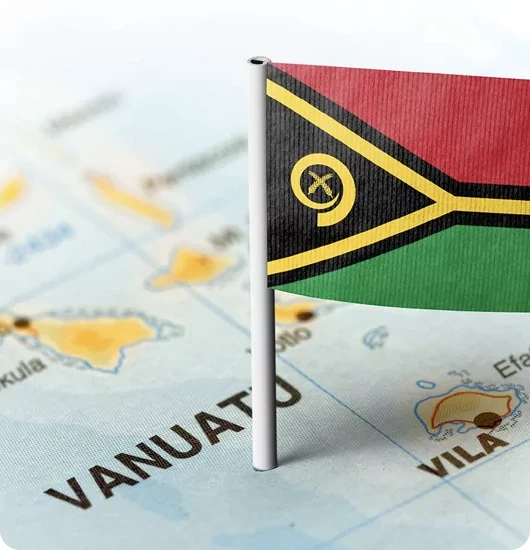Until recently, the Vanuatu passport was considered one of the most convenient for investors. It opened doors to more than 130 countries, including visa-free entry to the Schengen area. However, the situation has changed: the EU has officially suspended the visa-free regime for holders of Vanuatu citizenship. The European Union’s decision was a result of a review of security and transparency standards for citizenship by investment programs. Now travelers from Vanuatu are required to obtain a Schengen visa or an ETIAS electronic authorization in advance, which adds time and bureaucracy.
Our lawyers closely monitor changes in the EU visa policy and know how to adapt your investment decisions to the new realities. We advise clients on updated requirements, assist with document submission, visa preparation, and analysis of alternative second citizenship programs that still provide visa-free access to the Schengen area. If you are planning travel, investments, or relocation to Europe, do not act at random. Rules are constantly changing, and only professional legal support ensures that your passport and investments work for you, not against you.

The status of the Vanuatu passport for entry into the Schengen area in 2026
For many years, the Vanuatu passport was considered one of the most attractive for investors wishing to gain free access to Europe. Visa-free travel with Schengen Zone countries allowed Vanuatu citizens to travel across Europe without visas for up to 90 days, making the citizenship by investment program one of the most popular in the world. However, the situation has changed: the European Union has officially suspended the visa-free agreement with Vanuatu.
The EU’s decision was made after analyzing the country’s investment program known as Citizenship by Investment. Brussels expressed concerns about the standards for vetting applicants and potential security risks. As a result, citizens of Vanuatu can no longer enter the Schengen Zone without a visa, and all previously issued permits and privileges have been revoked. Now, traveling to Europe requires obtaining a Schengen visa category C or an electronic ETIAS authorization, which will come into effect at the end of 2026.
In practice, this means that holders of Vanuatu passports must go through all standard consular procedures: submitting an application, an interview, providing financial guarantees, and confirming the purpose of the trip. For many investors who previously used a Vanuatu passport for business trips, attending conferences, or opening accounts in Europe, the new rules have become a significant restriction.
Nevertheless, it is important to emphasize that the cancellation of visa-free travel does not render the Vanuatu passport invalid or useless. It still provides visa-free access to more than 90 countries, including Singapore, Hong Kong, Malaysia, and most Caribbean states. Moreover, the citizenship program remains one of the fastest in the world, as the process takes about two months.
Schengen Zone in 2026: Who Joined and What to Expect?
The year 2026 became a turning point for the European space without internal borders. After long years of negotiations and technical checks, Romania and Bulgaria officially became full members of the Schengen Zone, completing a years-long integration process. This decision strengthened the unity of the EU and expanded the territory of free movement to record levels. Now the Schengen Zone includes 29 countries, covering almost the entire continent.
The first stage of this process was the decision on March 31, 2024, when border control at air and sea borders was lifted for Romania and Bulgaria. At that time, passengers arriving in Schengen Zone countries from Bucharest, Varna, or Sofia could already pass without passport control. However, at land border crossings between Bulgaria, Romania, and neighboring EU countries (in particular, Greece and Hungary), checks were still in place.
The key change occurred on January 1, 2025, when the European Council officially approved the abolition of controls at land borders as well. Now citizens of the EU and other countries enjoying Schengen rights can freely cross the territory of Romania and Bulgaria by land, just like any other country in the zone.
The expansion of Schengen has strengthened the economic and transport connectivity of the region. For businesses, this means simplifying logistics and cargo transit, reducing border crossing times, and increasing the attractiveness of the Balkans for investments and tourism. This is especially significant for transport and logistics companies operating on routes between Central Europe and the Eastern Mediterranean.
For citizens of EU countries and travelers holding Schengen visas or residence permits, the expansion of the zone has become a symbol of returning to one of the basic ideas of European integration – freedom of movement without borders. Now, the journey from Lisbon to Varna or from Berlin to Sofia can be completed without a single stop at passport control.
Candidates for accession: Cyprus and the Western Balkan countries
Despite the fact that Cyprus has been a full member of the European Union since 2004, it is still not part of the Schengen Zone. The government of the republic is actively promoting integration, and by the end of 2025, the country plans to complete all the necessary technical preparations for joining: modernization of border control, unification of the visa system, and connection to the Schengen Information System (SIS). However, the official date of accession has not yet been determined and will depend on the decision of the European Council.
The countries of the Western Balkans considering joining the EU and the Schengen Area include Bosnia and Herzegovina, Serbia, Montenegro, Albania, and North Macedonia. All of them are official candidates for membership in the European Union; however, their path to integration remains long and gradual.
Unlike Romania and Bulgaria, which have already completed all technical checks and political agreements, the Western Balkan states are only beginning the process of adapting their legal systems to EU standards. Their entry into the Schengen Zone is possible only after obtaining full EU membership, which in 2026 remains a distant prospect. Nevertheless, the EU continues to support these countries financially and technically, viewing them as a strategically important region for Europe’s stability.
It is worth noting Croatia separately, which has already become a full-fledged member of the Schengen Zone as of January 1, 2023. This event often causes confusion, as the country was previously mentioned in the context of candidates. In practice, however, Croatian borders are fully integrated into the Schengen Area, and EU citizens and holders of Schengen visas can freely cross the country’s territory without border checks.
Which passports provide the best access to Schengen?
Freedom of movement remains one of the main criteria when choosing an investment citizenship program. For investors and entrepreneurs, a passport is not just a document but a tool for international mobility, opening doors to new markets, opportunities, and partnerships. In 2026, the top three leaders in visa-free access to the Schengen Zone still include passports from European Union countries, as well as several Asian and Caribbean jurisdictions.
The unconditional leaders include passports of EU countries, including Germany, France, Italy, Spain, the Netherlands, and Malta. Their citizens can freely move across 29 Schengen Zone countries without visas, as well as enjoy the benefits of the internal market and the right to reside in any European Union country.
Among countries outside Europe, the strongest positions are held by Singapore and Japan. Their citizens have visa-free access to most countries in the world, including all Schengen Zone states.
Among the citizenship-by-investment programs offering visa-free entry to the Schengen area, Malta, St. Kitts and Nevis, Antigua and Barbuda, Dominica, Saint Lucia, and Grenada hold a special place. Holders of these passports can travel to European countries without a visa for up to 90 days within a six-month period. These jurisdictions are distinguished by a high level of legal protection and recognition by the EU, making them attractive for those seeking a combination of mobility and reliability.
Against this backdrop, the Vanuatu passport appears less advantageous specifically in the context of access to the Schengen zone, especially after the suspension of the EU visa-free regime. However, its value is not limited to visa opportunities. Vanuatu offers unique advantages: fast processing times, no taxes on global income, the possibility of dual citizenship, and confidentiality of investors’ data.
In addition, the Vanuatu passport provides visa-free access to more than 90 countries, including Singapore, Hong Kong, Malaysia. For many investors, this becomes an effective diversification strategy, especially when combined with residency or business structures in other jurisdictions.
Key advantages of Vanuatu citizenship in 2026
Today, citizens of Vanuatu can travel visa-free to more than 90 countries, including key business and financial hubs in Asia, the Middle East, and Europe. Among them are Hong Kong, Singapore, Russia, Malaysia, Indonesia, the Philippines, as well as most countries in the Caribbean region and Oceania. For investors and entrepreneurs, this means the ability to move freely between international financial centers without the need to undergo complex consular procedures.
Although access to the Schengen Zone was suspended in 2026, Vanuatu citizenship continues to provide owners with broad opportunities for business, investments, and living abroad. Many use it as a second passport for asset protection and mobility in Asian and Pacific markets.
One of the main advantages of Vanuatu remains its complete tax neutrality. The country has no taxes on global income, dividends, interest, inheritance, or capital gains. This makes Vanuatu an especially attractive choice for international entrepreneurs, traders, owners of holding companies, and family trusts. Such a policy allows investors to legally minimize their tax burden and maintain the confidentiality of financial flows.
The Citizenship by Investment Program in Vanuatu is known for its speed and transparency. The process takes only 2–3 months and can be fully completed remotely without the need to visit the country. The investor is required to provide a minimal set of documents and proof of the legal origin of funds. This makes Vanuatu one of the most accessible jurisdictions for obtaining second citizenship in the world.
The Vanuatu program also guarantees a high level of privacy and data protection. The passport holder is not required to renounce their first citizenship, and information about new citizens is not subject to public disclosure.
Find out how a Vanuatu passport can serve your goals in 2026
Our team specializes in providing comprehensive support to clients in the process of obtaining Vanuatu citizenship. We start with an individual consultation, where we analyze your current situation, citizenship, tax residency, and goals, whether it’s expanding travel opportunities, asset protection, or tax optimization. Then we develop a personalized strategy, selecting the optimal investment structure and preparing a complete set of documents in accordance with the requirements of the Vanuatu government.
We accompany the client at every stage: from submitting the application to obtaining the citizenship certificate and passport. All procedures can be carried out remotely, without visits to the country. We ensure absolute confidentiality, acting strictly in accordance with international AML/KYC compliance standards and the legislation of Vanuatu.
In addition, our lawyers provide consultations on tax and corporate planning issues, helping to integrate Vanuatu citizenship into a broader strategy, whether it is the creation of an international holding, opening accounts abroad, or structuring inheritance. We also explain how the new visa rules affect movement within the Schengen Zone and offer practical solutions: from obtaining visas to alternative citizenship programs.
The main goal of our work is not just to issue a passport, but to create a legally protected and effective system of personal and financial security for you.
Contact our lawyers today to learn how Vanuatu citizenship can become your tool for global freedom, tax optimization, and asset protection. We will help you go through the entire process quickly, safely, and with a guarantee of results.
